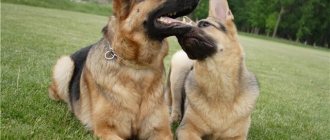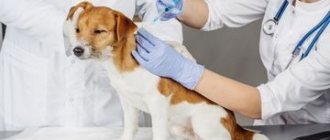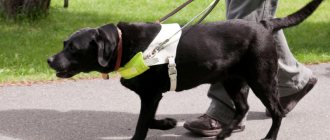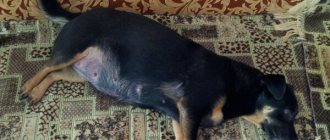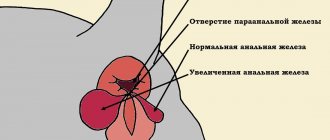Regular vaccinations are an important part of caring for your pet. Vaccinations significantly reduce the risk of many diseases, and are also a prerequisite for participation in exhibitions and competitions, when traveling on public transport.
A seemingly simple manipulation is a serious intervention that has certain contraindications. It is necessary to take into account the dog’s condition and properly prepare it for vaccination so that the vaccination is beneficial and no complications arise.
When can you start vaccinating your puppy?
Ideally, if circumstances permit, it is advisable to keep the puppy breastfed for at least 8 weeks. In the early “milk” period, passive immunity is formed, which will protect it for 2–3 months, after which there will be a sharp decrease in the number of maternal antibodies transferred to the baby with milk.
It is not recommended to vaccinate a puppy before 8 weeks, since his immune system is not yet fully developed. The optimal period for the first vaccination is 8–12 weeks, when the number of antigens begins to rapidly decrease and the pet’s body becomes very susceptible to infections. In special cases, you can vaccinate a puppy at 4–6 weeks, but only according to indications, if the risks of contact with distemper and enteritis viruses are high.
General Tips
Regardless of the type and direction of the vaccine, only healthy dogs are vaccinated after preliminary treatment against external and internal parasites. Be sure to calm and reassure your pet immediately before vaccination so that he relaxes and feels as comfortable as possible.
You cannot physically and psychologically overload the dog. It is important to maintain cleanliness in the place where the pet is kept and the dog’s hygiene itself.
Pregnant and lactating bitches should not be vaccinated. It is also undesirable to vaccinate during the period of estrus, and puppies - during the change of teeth (approximately 2.5 - 8 months).
It is necessary to have constant contact with the veterinarian so that, in case of questions or unforeseen situations, you can immediately contact him.
Types of vaccines
There are two types of drugs - inactivated and attenuated, so-called “live” vaccines. Each of them has its own advantages and features.
Attenuated vaccines contain live, weakened microorganisms. They are not capable of causing disease, but provoke an immune response. Thus, the body already has experience in fighting the pathogen, and if it encounters it, it knows what to do.
When an inactivated (killed) vaccine is administered, the immune system will not be as intense, but this is the best choice for particularly dangerous diseases, such as rabies.
As a rule, the first vaccination against major diseases is carried out twice, with an interval of 2–4 weeks. Then it is repeated every year to maintain a full immune response in case of infection.
The composition of vaccines can be single-component (monovalent) or complex (polyvalent). Single-component drugs build immunity to a specific infection, for example, canine distemper. Single-component vaccines are not popular due to the widespread use of multi-component vaccines, but in case of risk of epizootics they are sometimes used. Complex (multicomponent) vaccines have their advantages. They form immunity to several infections at once, which allows you to relieve your dog of stress when visiting the clinic and get by with just one injection.
Is it possible to administer the vaccine yourself at home? Is it worth it?
This option is acceptable. It happens that there is no specialist nearby, and the clinic is very far away. Sometimes people just want to save money - the difference will be significant. In this case, you need to have the skills to administer injections to animals. Know how to handle the drug, store and transport it correctly.
If the vaccine is not stored at 4-8 degrees, it will die. It is important to prepare the animal yourself, as described above. Follow the instructions in the instructions for the drug (age, date of revaccination). Be sure to decontaminate the syringe and containers by burning or boiling for 15 minutes.
Important! Such a vaccination will not be confirmed by the regulatory authority!
Even self-glued labels from bottles of the drug will not give you permission to move or take other actions that require vaccination of your pet.
In this case, revaccination is carried out, but in an official institution. This is especially true for rabies vaccination.
What diseases are puppies vaccinated against?
Despite the fact that many diseases can be cured today, in some cases preventive measures - vaccinations - still remain the most effective. The main diseases against which you should vaccinate your dog:
- rabies;
- carnivore plague;
- parvovirus enteritis;
- adenovirus
If you do not vaccinate against these diseases, then if your dog becomes infected, at best, he will become seriously ill, and at worst, he will die. There is no alternative for rabies - once clinical signs appear, the mortality rate is 100%. Therefore, you should not neglect this vaccination, even if you are the owner of a lap dog.
Vaccination for dogs
Dogs must be vaccinated! Some will prevent the development of a number of serious diseases, and some will save his life itself. So, what vaccinations do dogs get, the vaccination schedule, and what needs to be done before the vaccination so that the dog does not experience complications?
Many contagious diseases can be fatal to dogs (rabies, canine distemper, etc.), and a number of diseases are transmitted to humans. Vaccinations for dogs help reduce this risk. Pathogens can enter the body through contact with a sick animal, or while walking, when a dog sniffs or licks the excrement of sick animals.
We emphasize once again that the decision to vaccinate against a particular disease should be made by a veterinary specialist.
Vaccination against rabies is mandatory in our country; it must be given to all dogs. Vaccinations against other equally dangerous diseases are also required. For example, for canine distemper, the veterinarian who administers the vaccination can also advise you on whether your dog needs additional vaccinations, depending on the dog's lifestyle, health, other risk factors and environment.
Here is a list of the most common and dangerous diseases that dogs can become infected with:
- Rabies. The disease in 100% of cases ends in the death of the dog. Can be transmitted to humans. Infection occurs through contact with sick animals. Vaccination is required!
- Parvovirus enteritis of dogs. A highly contagious disease transmitted from sick animals, as well as insects that carry the disease. Dehydration, vomiting, and diarrhea occur. For puppies that have not yet developed immunity, the disease is fatal.
- Plague of carnivores. Infection of a healthy dog can occur through airborne droplets. The most susceptible dogs are the Laika breed. It is very difficult to treat, so some dogs die.
- Canine parainfluenza. The causative virus affects the upper respiratory tract, causing coughing and nasal discharge. This disease is not fatal, but complications such as pneumonia in dogs can occur.
- Leptospirosis. A dangerous disease that has an acute course, accompanied by diarrhea, fever, and abdominal pain. It can be transmitted from other infected animals, including hunting animals - arctic foxes, martens, ferrets, as well as rodents (mice, rats, etc.). Leptospirosis can also be transmitted to humans.
- Lyme disease in dogs. Transmitted by infected ticks. For hunting dogs that frequently visit the forest, vaccination is required. Sick animals experience lameness, lack of coordination of movements, the dog is incapacitated for several months (and in the absence of proper treatment, for life) and is unsuitable for hunting.
- Coronavirus (coronavirus enteritis) of dogs. Accompanied by diarrhea and lethargy. It is transmitted from infected animals, as well as their feces.
Veterinary clinic "Alpha Vet", we work around the clock!
+7,
Your veterinarian will create the best vaccination plan for your dog.
Now there are universal vaccines that protect against several diseases at once. For example, Nobivac (Nobivak) is a vaccine that immediately protects against parvovirus enteritis, parainfluenza, canine distemper and adenovirus. Domestic dog breeders prefer to use imported vaccines - they are more expensive, but more effective and safer than ours.
The dog vaccination schedule is as follows:
The puppy's first vaccination is given one and a half to two months after birth. In the first month of life, the puppy “borrowed” immunity from its mother, but after one and a half months it is very weak, so dogs at this age are very susceptible to diseases. Be sure to get vaccinated against distemper at this time - puppies die from it very often. You can use the same Nobivac DHP+L.
The second vaccination is no later than 2 weeks after the first. We can recommend the nobi-vak DHPPi+RL vaccination.
The third vaccination is given to dogs when their teeth are completely replaced. As a rule, this is after 6-7 months. Be sure to get a rabies vaccination during this period.
The next vaccinations are given a year later. (Approximately when the dog is 1.5 years old), and subsequent vaccinations (4th, 5th, 6th, etc.) are given until the end of the dog’s life at intervals of one year.
Please remember that this is just an approximate vaccination schedule.
Vaccination for puppies
Before each vaccination, 10-14 days before the dog’s scheduled vaccination date, it is necessary to remove worms from your pet. Some dog owners believe that if the puppy is still young and has not tasted anything other than mother’s milk in its life, then it does not have worms. But dog owners lose sight of the fact that a puppy can become infected with parasites in the womb, or through milk! Therefore, you should always give your puppy antihelminthic tablets before each vaccination.
The timing of vaccinations should be postponed to another time if the dog is sick, looks very lethargic, has a fever, and other symptoms of illness are observed. Vaccinations can only be given to healthy dogs!
After vaccination, dogs need to be kept at home for 10-12 days, since after vaccination a dog’s immunity is very weak, and on the street the puppy can catch some kind of infection.
There is only one vaccine for puppies, which can be used from four weeks of age. This is “Nobivak Puppy DP” against plague and parvovirus enteritis (manufacturer Intervet International BV, Holland).
Data on imported and domestically produced vaccines that are widely used today for vaccinating dogs.
| Diseases | Vaccine names |
| Carnivore plague | "Biovac-D" "Multikan-1" "EPM" "Vakchum" Canivac C |
| Parvovirus enteritis | "Biovac-P" "Primodog" "Nobivak Parvo-C" |
| Plague + hepatitis | "Kaniwak CH" |
| Rabies | "Nobivac Rabies" "Rabizin" "Defensor 3" "Rabikan" (Shchelkovo-51) |
| Leptospirosis | "Nobivak Lepto" "Biovac-L" |
| Piroplasmosis | "Nobivak Piro" "Pirodog" |
| Adenovirus + parvovirus enteritis | "Biovac-PA" "Multikan-2" "Triovak" |
| Adenovirus + parvovirus enteritis + leptospirosis | "Biovac-PAL" |
| Plague + hepatitis + parvovirus enteritis | "Nobivak DHP" Trivirovax |
| Plague + adenovirosis + parvovirus enteritis | "Tetravac" |
| Plague + hepatitis + enteritis + parainfluenza | "Nobivak DHPPi" |
| Plague + hepatitis + enteritis + adenoviral enteritis | "Multikan-4" |
| Plague + hepatitis + enteritis + parainfluenza + leptospirosis | "Eurikan DHPPI2-L" "Nobivak DHPPi+L" |
| Plague + hepatitis + enteritis + adenovirosis + leptospirosis | "Biovac DPAL" "Multikan-6" "Gexakanivac" |
| Plague + enteritis + adenovirosis + leptospirosis + rabies | "Hexadog" "Multikan-8" |
| Plague + hepatitis + enteritis + parainfluenza + leptospirosis + rabies | "Eurikan DHPPI2-LR" |
| Plague + hepatitis + enteritis + parainfluenza + adenovirus + leptospirosis | "Vangard Plus 5 L4" "Vangard-7" |
| Plague + hepatitis + enteritis + parainfluenza + adenovirus + leptospirosis + rabies | "Biocan DHPPi + LR" |
| Plague + enteritis + coronavirus enteritis + adenovirus + leptospirosis + dermaphytoses (ringworm) | "Multikan-7" |
| Plague + hepatitis + enteritis + parainfluenza + adenovirus + coronavirus + leptospirosis | "Vangard Plus 5 L4 CV" |
Is it possible to feed a dog before vaccination?
It is better to vaccinate in the morning on an empty stomach. Water is provided without restrictions. If the procedure is planned for the second half of the day, then feed your pet 2-3 hours before it. If you feed your dog natural food (not dry food or canned food), then do not give your dog heavy foods.
How is vaccination carried out?
For vaccination, it is better to invite a veterinarian to your home. Immediately before vaccination, the veterinarian examines the animal and measures its body temperature. Additional blood tests may be needed, in which case the vaccination will have to be delayed until the results are available.
After examination and temperature measurement, vaccination begins. Most vaccines are available in liquid form in single-dose ampoules or vials (1-2 ml of liquid). One dose is always administered, the injection is usually given intramuscularly in the back of the thigh. Sometimes subcutaneous administration of the vaccine is allowed.
Possible complications
Dogs usually tolerate all types of vaccinations well, but in rare cases local and general adverse reactions may develop. Watch the dog.
- In about 5% of cases, a small swelling or lump forms at the injection site. It does not need to be treated; after vaccination, the puppy’s lump will resolve within 1–3 weeks. If the swelling increases or the injection site is sharply painful, then you need to consult a veterinarian.
- Allergies to vaccines in dogs are practically not observed. There is a small chance of developing anaphylactic shock (as with any biological drug). This dog reaction to the vaccine occurs 5-15 minutes after the vaccine is administered. Therefore, after the injection, you need to wait some time and not leave the veterinary clinic immediately, so that if the dog is in shock, it can quickly receive medical attention.
A normal reaction to vaccination may include (on the day of vaccination or the next day):
- increase in body temperature up to 39 °C;
- one-time refusal of food;
- single vomiting or diarrhea;
- The puppy may be lethargic after vaccination.
It is necessary to sound the alarm and contact a veterinarian if:
- diarrhea in a puppy after vaccination lasts more than one day;
- body temperature increased to 39–40 °C;
- after vaccination, the puppy began to vomit repeatedly;
- convulsions or muscle twitching are observed;
- there is no appetite, the puppy does not eat for a day or more after vaccination;
- drooling and discharge from the eyes and nose develop.
Sometimes a dog whines after vaccination. If you feel generally good and have an appetite, this is not scary - this is how your pet reacts to the stress of the injection.
How many days after vaccination can you walk your puppy?
If you have an area where other dogs have limited access (for example, your own garden or enclosure), then walking can begin before vaccination. Otherwise, it is not recommended to walk outside until the end of quarantine - otherwise you risk catching an infection.
The puppy develops immunity 2 weeks after the last injection of the vaccine. After this period, you can walk with your pet without restrictions and bathe it in a bath or natural reservoirs.
Call us, we can always come to an agreement!
Veterinary clinic "Alpha Vet", we work around the clock!
+7,
Basic rules for preparing a puppy for vaccination
First of all, all pet owners should remember that the vaccine is not a medicine, and therefore its administration will no longer help sick pets.
Vaccinations are given only to healthy dogs. Therefore, before administering the drug, the puppy needs to be examined by a veterinarian with mandatory thermometry.
In order for vaccination to go smoothly, you need to properly prepare the animal for vaccination and follow all the doctor’s recommendations after the manipulation:
- a week before the planned vaccination, you need to carefully monitor the puppy’s condition;
- a day after vaccination, monitor the pet’s condition, and if any alarming symptoms arise, contact a doctor;
- for two weeks after vaccination, limit your pet’s contact with other animals;
- you can walk your dog only in the area near the house, which must be kept clean;
- It is not advisable to feed the animal 3-4 hours before a visit to the veterinarian.
For the first vaccination, it is best to invite a veterinarian to your home so as not to expose the puppy to unnecessary stress and risk.
What needs to be done before the first or repeated vaccination of a puppy or adult dog?
Before immunization, the animal must undergo examination and appropriate preparation.
Important! If a deviation from the norm is detected, vaccination is prohibited.
Health check
The first step to prepare your dog for vaccination is thermometry. She should show 37.5-39.2. For puppies and small breeds – 38.5-39.4. The mucous membranes should be normal without signs of inflammation or anemia. The coat is healthy-looking and shiny, and does not fall out. Avoid wounds and skin defects. Appetite is within normal range. If your pet's condition is questionable, you can do a general blood test. This will exclude possible diseases. The vet will do everything. You can take a course of immunostimulants 30 days before vaccination.
Is it necessary and why to do worming?
Before vaccination, the dog is driven away from worms every time before this procedure. Puppies being vaccinated for the first time are dewormed twice. The fact is that a dog infected with worms becomes weakened. Immunity decreases. With a high degree of parasite infestation, the animal is exhausted, and there can be no talk of a qualitative response to the vaccine.
The worm in the intestines releases toxins that poison the body. The immune system will not be strengthened. On the contrary, an adverse reaction to the drug may occur, and the consequences are unpredictable. Vaccination itself deals a blow to all the vital systems of the pet, and if they are weakened, the load can become unbearable.
Deworming: a mandatory stage of preparation for vaccination
Deworming is carried out two to three weeks before vaccination. It is advisable if the drug is recommended by a veterinarian.
Deworming will rid your puppy of dangerous parasites that can negatively affect the formation of an immune response.
To prevent nematodes in puppies, Dironet® Junior can be prescribed. It contains an immunomodulator that promotes the regeneration of intestinal tissue damaged by helminths. Dironet® Junior also does not reduce immunity, so the waiting period before vaccination is reduced.
Since the drug acts only in the intestines and does not enter the systemic bloodstream, it has minimal contraindications and can be given even to small puppies.
conclusions
Preparing for vaccination is an important process for both a puppy and an adult dog. The quality of the formed immunity depends on this. Vaccination itself is stressful for the body. Side effects are possible, but with timely help the outcome is good. Parasites in the intestines weaken the animal. The range of anthelmintic drugs is wide. It is possible to vaccinate dogs at home, but only if you have skills in this area. This vaccination is not registered at the state level.
Please follow and like us:
Nikitin Sergey
I write about dogs based on the experience and knowledge gained during my studies as a veterinarian, work in my specialty, and simply from observing my pets.
Caring for the puppy after vaccination
After any vaccination, it is necessary to quarantine the puppy for two weeks, completely eliminating contact with other animals. During this period, he should be provided with adequate nutrition, normal sleep and, of course, maximum attention from the owner.
The pet should be protected from drafts and not bathed. Hypothermia can have a negative impact on the puppy's body, since during this period his immune system is weakened. In addition, physical activity should be limited and the animal should not be overtired.
Is it possible to feed and water
On the day of vaccination, you can follow your normal eating schedule. It is advisable not to feed heavy, fatty foods, so as not to overload the dog’s body.
Fresh water should be in sufficient quantity; you cannot limit your pet’s drinking. You should not feed your dog immediately before vaccination; it is advisable to rationally distribute the time so that the pet has time to digest what it has eaten.
It’s good to treat your pet to something tasty to please him and put him in a positive mood. On the day of vaccination, it is very useful to pamper your dog with acceptable treats.
Side effects
During the day after vaccination, the dog may be lethargic. Drowsiness and a slight increase in temperature are normal, so the owner should not be alarmed. You should contact your veterinarian if the above symptoms do not go away within a few days and increase in severity.
In some cases, the period after vaccination can be very difficult, causing serious adverse reactions:
- high temperature;
- nervous phenomena;
- vomiting;
- excessive salivation;
- shortness of breath.
In such situations, you should immediately contact a veterinarian to provide the animal with qualified assistance. You can’t hope that everything will go away on its own.
In addition to changes in the general condition, local reactions to vaccination in the form of compaction at the injection site are quite common. This lump usually resolves on its own within a week. You should consult a doctor if it does not go away and begins to grow and bother your dog.
Treatment for fleas, ticks and other external parasites
Various drugs are suitable for these purposes:
- sprays;
- drops;
- shampoos;
- collars;
- powders;
- solutions, etc.
Antiparasitic collars are not complete protection against fleas and ticks, but they perfectly complement, enhance and prolong the effect of the main drug. For this reason, it is advisable to combine several options for insectoacaricidal (antiparasitic) drugs.
Medicines are chosen individually, taking into account the composition. Different medications are used for puppies, adults and elderly pets. The dose is determined based on the weight and size of the pet.
You need to pay particular attention to the dosage when using anti-flea drops and sprays. Special shampoos, solutions and powders are easier to dose - no such precision is required.
The manufacturer indicates detailed instructions for use of each drug on the packaging, but there are general rules for all such drugs. It is necessary to ensure that the drug gets on the dog’s skin without remaining on the fur. Use medications against ectoparasites with caution in pets with skin lesions and other dermatological problems.
It is not advisable to pet or hug your pet within 12 to 24 hours after flea treatment.
Effective insectoacaricidal preparations are Advantix, Frontline, Kiltix, Hearts, Brovecto, Celandine, Dana, Bars and some other imported (Holland, Germany, Czech Republic) and domestic products.
How to choose an anthelmintic?
The anthelmintic drugs available on the market are equally effective, but not every parasite will be sensitive to the one you choose. Tape, round, flat, cestodes, nematodes, trematodes... Which of these pests has invaded your baby? To find out, you need to conduct a laboratory test of the dog's feces at a veterinary clinic. After this, the veterinarian will analyze the results and prescribe the optimal medicine. Deworming can also be carried out for preventive purposes. There is a specific group of medications for this. Therefore, you should not nervously type “which anthelmintic for dogs is best” into a search engine, because this is the doctor’s task.
Antihelminthics are available in various dosage forms:
- tablets;
- suspensions;
- drops on the withers
(special pipettes – spot-on – have recently appeared).
Ask your veterinarian about which of the above forms is right for your dog. So, tablets, for example, are designed for 10 kg of animal weight. It will be quite difficult to crush them for a Russian toy weighing 900 g. In this case, suspensions or droplets are useful.
When should an animal be dewormed?
“How many days before vaccination are dogs dewormed before vaccination?” – this is what interests a caring owner in the first place when it comes to vaccination. According to the rules, ten days. If, a few days after the dog takes the medicine, worms or mucus are still visible in its feces, the procedure should be repeated a week or two later. Only after the worms have been completely removed can vaccination be done.
For large breed puppies, the first deworming should be carried out at 3-4 weeks, for small breed puppies - after they reach a weight of 500 g. In this case, use products marked “For puppies”.
NotaBene! It is generally accepted that you need to give your pet a deworming drug every quarter. Actually this is not true. Anthelmintics contain potent substances. Taking them frequently may cause health complications. The optimal frequency of deworming is once every six months. It is advisable to use antihelminthic drugs every 3 months only when the animal eats raw minced meat and offal.
Pregnant and lactating females cannot be dewormed. This is done 2 weeks before mating. After all, harmful substances from the medication can penetrate through the placenta or milk into the puppy’s body and lead to embryotoxic effects and severe poisoning, respectively.
The first vaccination is given at 2 months. After 21 days, revaccination is carried out. You can walk outside after 10 days. At 1 year of age, the dog is given a comprehensive vaccine, which from now on must be done annually.
Why do you need to do anthelmintic treatment before vaccination?
A vaccine is purified and weakened viruses that, in an active state, cause disease, but in such a “half-dead” state they are not capable of causing harm. At the same time, they have the entire set of characteristics inherent to their species. The immune system, seeing foreign bodies, throws all its energy into neutralizing them and... easily defeats the deactivated pathogen. Specific memory cells are formed in the body, which immediately provide information about methods of combating pathogenic microorganisms in the event of re-infection. Unfortunately, immune memory is short-lived, so vaccinations should be done regularly.
And worms are parasites. They literally “eat” their owner, absorbing nutrients, vitamins and minerals from the food he eats and even from the blood and lymph. Helminths damage the intestinal mucosa, attaching to it with suction cups, disrupting the balance of microflora and, releasing metabolic toxins, causing intoxication and destructive processes in internal organs. In addition, the larvae of some worms can migrate from the intestine through the blood vessels to other organs, such as the lungs, uterus or liver.
The body perceives helminths as antigens and secretes antibodies to destroy them. If you do not give anthelmintic for dogs before vaccination, the immune system may not cope with two “enemies” at once and vaccination will either be ineffective or lead to the disease from which it was supposed to save (distemper, adenovirus infection, parainfluenza, parvovirus enteritis, leptospirosis or rabies ).
Why are helminths dangerous for dogs?
If timely deworming is not carried out, the animal may die. The larvae of parasites, entering the blood and blood vessels, deal a crushing blow to vital organs - the liver, gastrointestinal tract, lungs, heart muscle, kidneys, and brain.
Having chosen a “place of residence,” the larvae begin to grow exponentially, producing offspring and rapidly spreading throughout the body.
It is not difficult to determine whether a pet has worms; just observe its behavior. The dog behaves restlessly, constantly rides on its tail - thereby trying to relieve the itching in the anus caused by helminths. A previously active dog becomes lethargic and apathetic. His appetite disappears or, on the contrary, increases, problems with digestion arise, and hiccups appear. Diarrhea and vomiting are common, during which helminths are released. The animal loses weight or gains weight, it may experience bloating, and allergic rashes appear on the skin.
